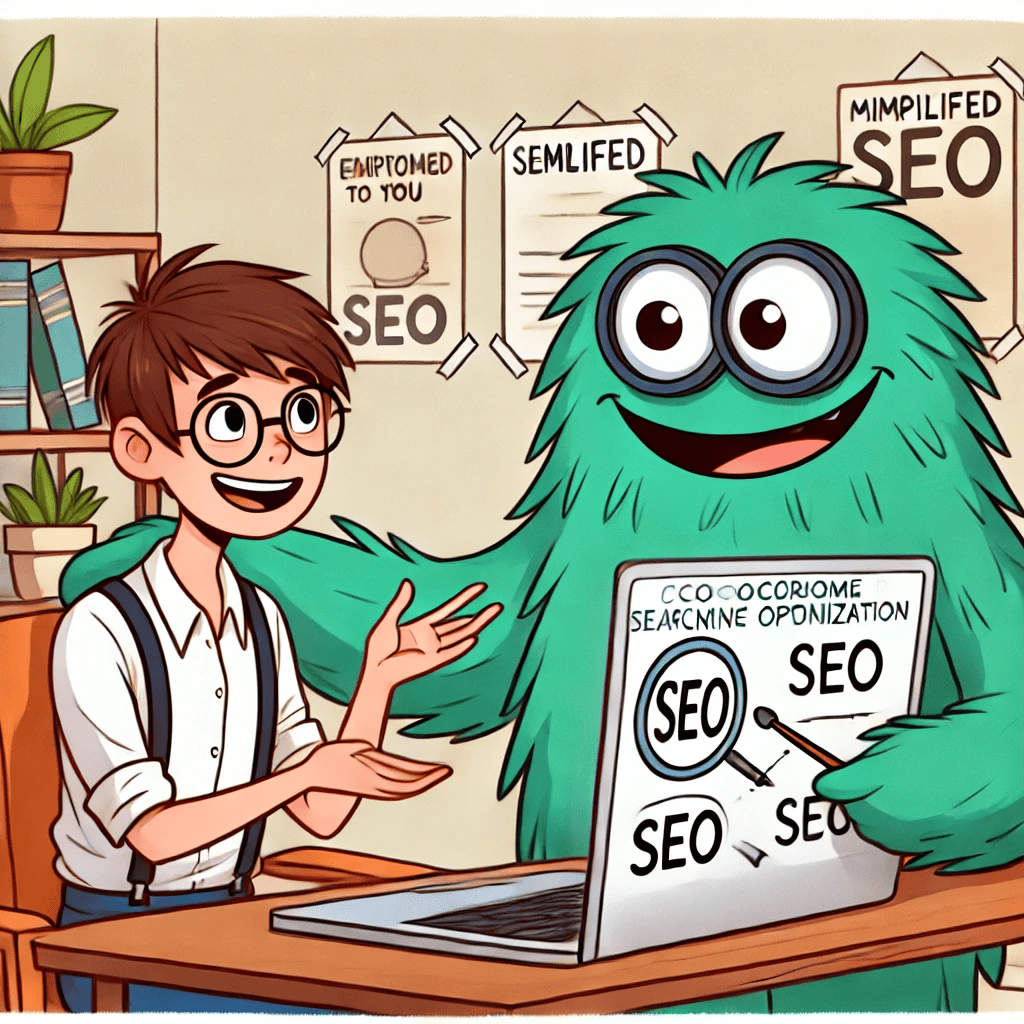And Why Is It Important for Beginners?
What is search engine optimization, and why should you care? It’s a term that often sounds intimidating to those just stepping into the world of digital marketing or setting up their own websites.
However, understanding the basics of SEO is not just beneficial but crucial if you want to increase the visibility of your website and attract more visitors. In this guide, we will break down what search engine optimization is, why it matters, and how it can help you achieve your online goals.

What Is Search Engine Optimization? (SEO)
Search engine optimization (SEO) involves optimising your website so that it ranks higher in search engine results pages (SERPs) like Google or Bing. This optimisation is crucial because the higher your website ranks for relevant keywords and phrases, the more likely you are to attract attention and new visitors from your target audience.
Core Components of SEO: Or, The Main Parts!
SEO can be broken down into three main components:
This refers to all the measures you can take directly within your website to improve its position in the search rankings.
This includes optimizing your content, improving your meta descriptions and title tags, and using HTML tags to emphasize certain content.
This involves all the actions taken outside of your own website to impact your rankings within search engine results pages.
Primarily, this involves links pointing to your site from elsewhere on the internet. The number of backlinks and their quality help to build your site’s reputation and authority.
Technical SEO:
This area focuses on improving the technical aspects of your website to increase the ranking of its pages in the search engines.
It includes improving site speed, ensuring your site is easy to crawl (for search engines), making sure that your site is secure, and creating a strong site architecture.
Why SEO Matters
The internet is a vast place, and without SEO, your site might as well be invisible. Here are a few reasons why SEO is crucial:
- Visibility and Rankings: One of the most important functions of SEO is increasing visibility, which means making it easier for prospects to find you when they search for something you have to offer. Visibility directly correlates to your ranking.
- Web Traffic: SEO also helps to increase web traffic. By optimizing your site, you improve your chances of appearing in top search results, which makes it more likely that potential customers will click through to your site.
- Credibility and Trust: Websites that appear higher in the search results are viewed as more credible and trustworthy. Over time, by improving your SEO, you can work on building trust, which is crucial for attracting and retaining customers.
- User Experience: Good SEO involves providing a positive user experience that is key to improving engagement and ultimately conversions on your website.
Common Misconceptions About SEO
As a beginner, you might encounter several misconceptions regarding SEO. It’s important to clear these up:
- SEO is a one-time task: SEO is an ongoing process. The search engine algorithms are constantly changing, and your competitors are also optimizing their sites. Staying on top of SEO means continuously monitoring and adjusting your efforts.
- SEO is all about ranking: While rankings are important, they’re not the sole purpose of SEO. Effective SEO focuses on enhancing both the quantity and quality of incoming traffic.
- Keywords are the only SEO technique that matters: Keywords are fundamental to SEO, but they are not the only thing that matters. A holistic SEO strategy includes technical SEO, content marketing, link building, and user experience optimizations.
And Finally...
What is search engine optimization really about? It’s not just about being found, but about being found by the right people. SEO is a complex field, but it’s also one that’s rewarding to master. By starting with the basics and progressively deepening your understanding, you can significantly improve your website’s performance in search results.
Whether you’re running a personal blog, a small business site, or a large ecommerce platform, the principles of SEO apply to you. Start implementing what you’ve learned today, and watch as your website begins to climb the search rankings, attract more traffic, and generate more business.

SEO doesn’t have to be scary. It’s the help you need to be seen on the search engines.
If you’re curious to learn more, Google’s SEO Starter Guide is a great place to start
Have you started using SEO techniques on your site yet? Or maybe you’ve heard of it but not sure where to begin? I’d love to hear what stage you’re at in your online journey. Pop your thoughts or questions in the comments—let’s get learning together!
Here’s a little transparency: My website contains affiliate links. This means if you click and make a purchase, I may receive a small commission. Don’t worry, there’s no extra cost to you. It’s a simple way you can support my mission to bring you quality content.”


I have to admit the word SEO sometimes sends me into a tailspin. I know that SEO is an important focus to retain traffic and get Google juice flowing, but how can beginners measure the success of their SEO efforts beyond rankings and traffic?
You built the website. Rankings don’t happen right away when the website is still green and being fleshed out into the giant behemoth it has the capability of becoming. There is the tendency to get frustrated though when you are burning the midnight oil coming up with content without the rankings to back those efforts up. So, what are some other indicators to look for to know that you are going in the right direction?
Thanks for your comment, Jason!
You’re absolutely right—SEO can feel overwhelming, especially when results take time to show up in rankings and traffic. Beyond those metrics, beginners can measure success by looking at things like:
Engagement metrics: Check how long visitors are staying on your site (time on page) and whether they’re interacting with your content. Are they clicking on internal links or sharing your content?Conversion rates: Even small wins, like sign-ups for a newsletter, downloads, or inquiries, show your SEO efforts are attracting the right audience.Indexing progress: Use tools like Google Search Console to see if more of your pages are being indexed and if impressions are increasing over time.Keyword growth: Track how many keywords your site is ranking for, even if they’re not on page one yet. Growth here means your content is resonating with search engines.
Building a great site takes time, and focusing on these signs of progress can keep you motivated while the rankings catch up.
This is a fantastic overview of SEO, especially for beginners who might find the term daunting. I appreciate how the article breaks down the core components—On-Page, Off-Page, and Technical SEO—making it easier to understand the different aspects involved. I recently started optimizing my own websites, and I can attest to how crucial even small changes in these areas can be. One thing I’ve noticed is that improving site speed and mobile responsiveness not only boosted my rankings but also enhanced user engagement. What’s your take on the evolving importance of voice search in SEO?
Hello Herman
Thank you for taking the time to visit my website and comment. I really appreciate it.
As with all new innovations it takes some of us (of a certain age) to get our heads around the concepts whereas the younger generation seem to pick it up and run with straight away. Voice search appears to be moving fast and shall, I believe, have a huge impact on the way we search the internet. It’s something I have to get my head around – being of that certain age!
Jackie
This post does a fantastic job breaking down SEO into digestible components for beginners. The distinction between on-page, off-page, and technical SEO is clear and helpful, making it easier to understand the multi-faceted nature of optimization. I also appreciate the focus on dispelling common misconceptions, which can be a significant hurdle for newcomers.
What tools or platforms would you recommend for beginners to effectively track and analyze their SEO progress as they implement these strategies?
Hi John and thank you for your comment.
Beginners can start with tools like Google Analytics and Search Console for tracking SEO progress. Platforms like Wealthy Affiliate are also great for learning and applying SEO strategies with built-in tools and training.
Jackie
Hi John and thank you for your comment.
Beginners can start with tools like Google Analytics and Search Console for tracking SEO progress. Platforms like Wealthy Affiliate are also great for learning and applying SEO strategies with built-in tools and training.
Jackie